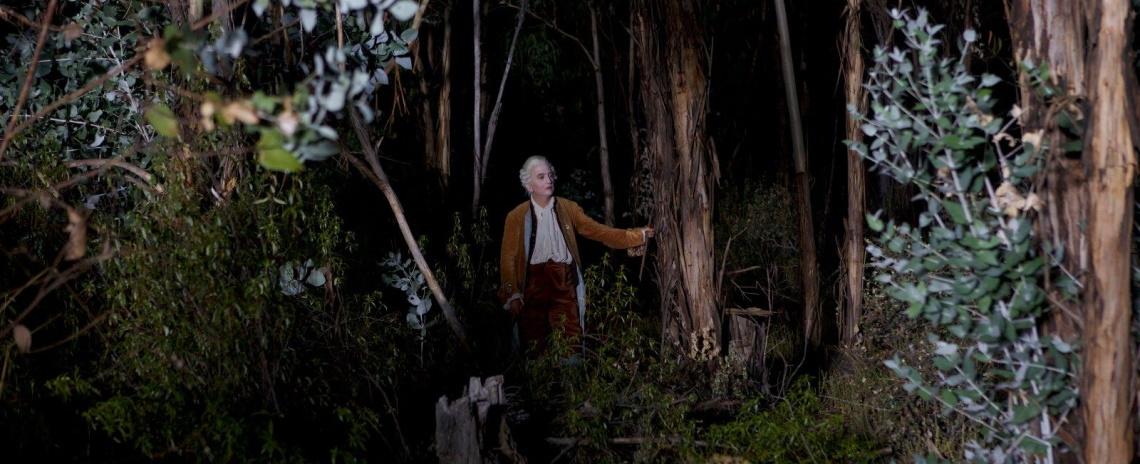Last year Céline Sciamma released her finest work, Portrait of a Lady on Fire, a treatise on art and spectatorship, passion and creation. In her exacting mise-en-scène, the director repurposed visual art – along with more than a century of cinematic love-story language – contemporaneous to her isolated French lovers’ 18th-century setting. The film is lush and romantic, a swoon-inducing marvel as intellectually rigorous and provoking as it is as relentlessly arresting.
Albert Serra’s latest, Liberté, employs strikingly similar means to vastly different ends. This 18th-century-France-set film also mimics European art of the time – baroque edging into rococo here – using observational frames to investigate his characters’ and viewers’ voyeurism. While Sciamma approaches reverence for her influences, re-working the male gaze into a queer one, Serra takes the piss out of his and, turning the phrase quite literal, showers his subjects’ bodies and faces with it. Unlike Portrait, the passion presented here is not one of romantic or creative love. For the ousted, powdered-wig-wearing libertines in Serra’s film, appetites can only be sated in strictly carnal ways: Its nocturnal forest orgy presents an unending series of kinky one-upmanships, taboo-busting sexual acts seemingly generated by a game of dirty Mad Libs.
This Cannes Film Festival prize-winner is by turns repellent, funny, transcendent, and mind-numbing, but it’s nevertheless consistently mesmerizing, featuring nearly unrivaled – save for Pedro Costa’s similarly dreamlike Vitalina Varela from this year – hypnagogic digital photography. Inspired by the rococo works of François Boucher (or, alternatively, a sylvan Vermeer filled with bare asses), the film's visual scheme is seductive even when its prurience is purposefully overwhelming. The unsimulated sex, which nearly fills all of the film’s 132 minutes, will no doubt turn off more casual arthouse viewers than turn on those who tend toward the freaky, although it does feature encounters of nearly every possible combination of its male and female performers, who come in all shapes and sizes.
Serra’s provocation belongs to a tradition of arthouse-cum-hothouse boundary-pushers like Vilgot Sjöman’s I Am Curious (Yellow) (1967), Dušan Makavejev’s appropriately titled Sweet Movie (1974), Oshima Nagisa’s In the Realm of the Senses (1976), and, more recently, provocateur supreme Lars von Trier’s Nymphomaniac (2013). Although the allure of the exposed might get some butts in seats, those more attuned to the vibrations of successfully executed art films know the sex there – like the off-screen variety – is never simply about getting one’s rocks off.
Banished from court following the death of Louis XIV, the “deviant” bourgeoisie of Liberté seek a society lacking false righteousness and labels of impropriety. In the film’s few dialogue-heavy scenes, Madame de Dumeval (Theodora Marcadé) and the Duke de Wand (Baptiste Pinteaux) attempt to woo Duc de Walchen (Helmut Berger), an infamous German philosopher, into their utopian ideal. Elsewhere, action is the overriding mode of Liberté, as two broken-down carriages centered in the sparsely forested frame become a hub for the dozen-or-so participants. The fun and games involve ropes, pitchforks, all sorts of liquids, and what appears to be severed animal genitalia. The players’ carefully constructed finery becomes tattered, their powder-caked faces grimy.
The setup is ostensibly a horny period-set version of Buñuel’s 1962 masterpiece The Exterminating Angel, in which members of Mexican high society are trapped in a dinner party from hell that quickly descends into a Darwinian free-for-all among the bourgeoisie. The French partygoers here might initially rendezvous with philosophical purpose, but their increasingly joyless activities devolve from S&M to wholly sadistic: A woman begs to be doused with cold milk before one of the men present decides to remove the stool on which she is balanced, leaving her hanging by her hands and helpless.
Serra is keenly aware of his mix of queasy and titillating, framing his oft-still shots so that his characters are obscured by darkness, branches, and other figures. Regardless of viewers’ tolerance of his sexual tableaux, they may very well find themselves craning their necks in an attempt to peer around such obstructions. They are, after all, like the film’s characters, id-driven creatures. Some are capable of either exploring their lizard-brain tendencies without causing undue harm, while others see a newfound outlet for them to batter, bruise, and subjugate. Power is the ultimate corruption, especially when it springs from a delusion of emancipation. With Liberté, Serra explores the boundaries of the body, and, in turn, finds the limitations of freedom.
Rating: B+
Liberté is now available to rent online through the Cinema Guild. Purchase a virtual ticket from May 8 - 21 and the proceeds will support the Webster University Film Series.


